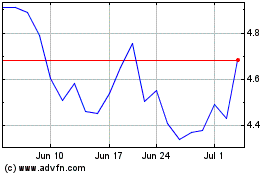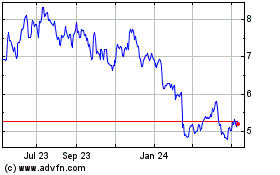By Christopher Alessi
FRANKFURT -- The boss of Thyssenkrupp AG is finally on the brink
of putting steel in the German company's past -- if he can sever
ties with its European steel legacy.
The storied industrial firm, which traces its roots to the early
19th century, took a big step away from its once-core steel
business when it unexpectedly announced late last month the sale of
the last of its beleaguered steel assets in the Americas, a
Brazilian plant. The deal, flagged by The Wall Street Journal in
October, is the most concrete sign to date that Chief Executive
Heinrich Hiesinger is driving forward the company's transformation
from staid steel giant into a lean capital-goods operation.
Investors are watching to see whether Mr. Hiesinger can deliver
on the next part of his strategy: separating Thyssenkrupp's
European steel business. That unit has been squeezed by a
protracted steel glut and inexpensive steel imports from China,
amid continuing consolidation in the industry.
Mr. Hiesinger has said he wants to remake Thyssenkrupp around
high-margin capital goods such as elevators, sophisticated car
components and submarines. But his efforts to get rid of the
Brazilian plant were long thwarted by challenging market conditions
in that region.
The company plans to sell the plant to Ternium SA, a
Luxembourg-based steel producer with a strong presence in Latin
America, for EUR1.26 billion ($1.33 billion). The transaction would
result in a EUR900 million write-down, but would also reduce the
company's roughly EUR3.5 billion in net debt by EUR1.5 billion.
"Folks in the market thought [the plant] would be an overhang
and realize very little value," said F. David Segal, a portfolio
manager at Franklin Mutual Series, a Thyssenkrupp shareholder.
"The fact that they were able to get what appears to be good
value earlier than anticipated allows all stakeholders to focus on
the future of Thyssenkrupp when it's out of the steel business,"
Mr. Segal said.
European steelmakers have shed thousands of jobs and closed
unprofitable plants in recent years. After hitting all-time lows in
early 2016, steel prices have since started to rally, helped in
part by moderating competition and plant closings, experts say.
"The steel industry is now a global industry and to [compete in]
that you need size," said Ben Orhan, a steel expert at IHS Markit
Ltd.
Thyssenkrupp has been in talks with India's Tata Steel Ltd. for
roughly two years to form a European flat-steel-products joint
venture that would allow the German firm to untangle steel from its
capital-goods operations. But the potential deal has stalled in
part over a dispute regarding pension obligations.
Mr. Orhan said a tie-up between Thyssenkrupp and Tata "makes
perfect sense," but the companies could lose their window of
opportunity.
"The longer it sits, the less likely it becomes," Mr. Orhan
said.
A spokesperson for Tata said the company continues to be
"engaged in constructive discussions" with Thyssenkrupp on a
tie-up.
Mr. Hiesinger declined to comment for this article. Thyssenkrupp
has said that consolidation in the European steel industry is
necessary, and that it is in talks with Tata and others.
If Thyssenkrupp is ever going to be seen by investors as a
lucrative capital-goods enterprise rather than a slow-growing steel
dinosaur, it would have to secure a deal with Tata soon, according
to investors.
Mr. Hiesinger would have to show he can "get that across the
finish line, " said Franklin Mutual's Mr. Segal.
A deal with Tata or a spinoff of the European steel business
would likely mean the gap with peers "should close and the market
should focus on Thyssenkrupp as a capital-goods company," Mr. Segal
said.
Thyssenkrupp posted total sales of EUR39.29 billion and net
profit of EUR296 million in fiscal 2016. Its elevator business --
the crown jewel of its capital-goods businesses -- delivered a
profit margin of 11%, compared with a margin of 5.7% at Steel
Europe and a loss at Steel Americas.
"We are now more independent from fluctuations in the steel
market," Mr. Hiesinger said following the announcement of the
Brazilian plant sale. After the deal, expected to close by October,
Thyssenkrupp will generate roughly 75% of sales from capital goods,
Mr. Hiesinger said.
Since Thyssenkrupp hired Mr. Hiesinger in 2011 following
corruption scandals and years of stagnation, the Siemens AG veteran
has steered the company back to a fragile profitability. One of his
initial moves was to sell Thyssenkrupp's troubled Alabama
steel-rolling and coating plant for $1.55 billion to a consortium
of ArcelorMittal SA and Nippon Steel Sumitomo Metal Corp.,
improving the balance sheet and shifting investment to capital
goods.
The expected sale of the Brazil plant "sets the stage for a
successful re-rating" of the company based on its capital-goods
businesses, said Seth Rosenfeld, an analyst at Jefferies LLC.
But it is unclear whether investors will value Thyssenkrupp on
par with profitable capital-goods firms such as German peer
Siemens.
"One of the big problems of Thyssenkrupp is that it doesn't
generate any free cash flow, and the last quarter was again a huge
disaster in terms of cash flow," said Joerg Schneider, a portfolio
manager at Thyssenkrupp shareholder Union Investment.
Free cash flow for the first quarter of fiscal 2017, ending Dec.
31, came in at a loss of EUR1.7 billion, which the company
attributed to a temporary increase in net working capital. "And
because of that I'm not willing to give them a multiple like a
traditional capital-goods company, " Mr. Schneider said.
Write to Christopher Alessi at christopher.alessi@wsj.com
(END) Dow Jones Newswires
March 26, 2017 15:00 ET (19:00 GMT)
Copyright (c) 2017 Dow Jones & Company, Inc.
Thyssenkrupp (PK) (USOTC:TKAMY)
Historical Stock Chart
From Mar 2024 to Apr 2024

Thyssenkrupp (PK) (USOTC:TKAMY)
Historical Stock Chart
From Apr 2023 to Apr 2024
